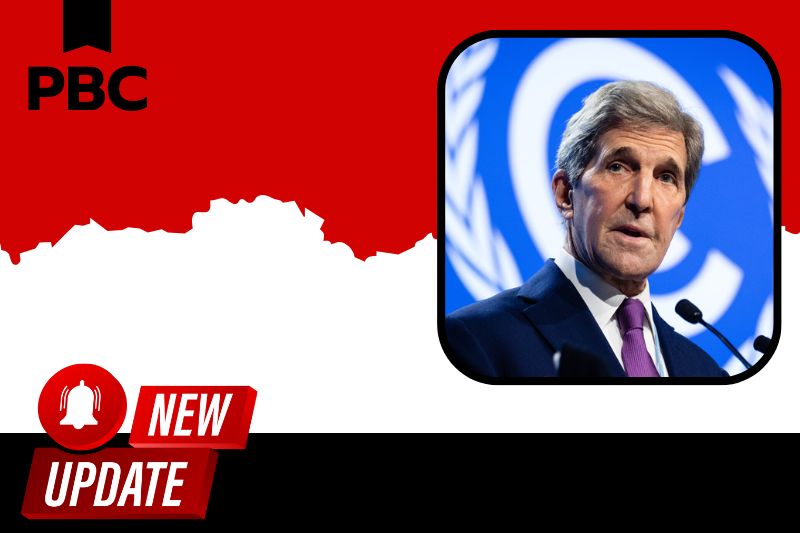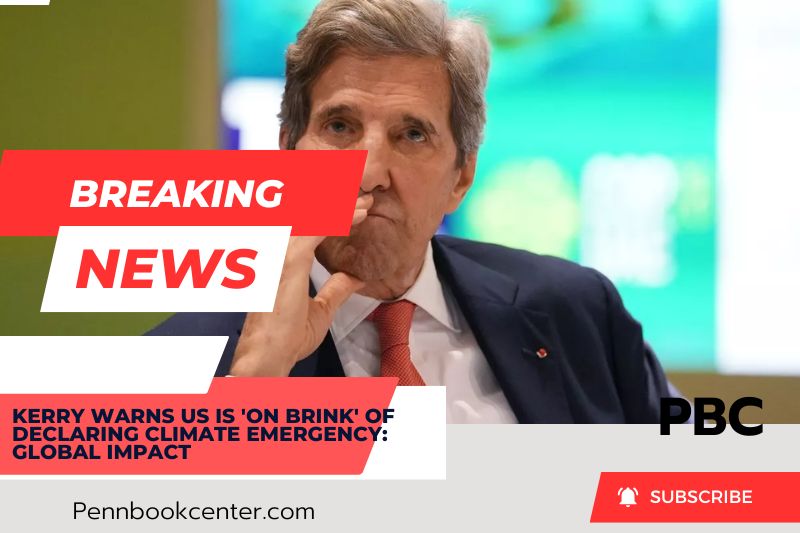John Kerry recently shocked audiences by warning that the U.S. is on the brink of declaring a climate emergency.
In a discussion at the Harvard Kennedy School, Kerry highlighted the escalating global climate crisis and stressed the need for urgent action. He emphasized how science must drive policies and decisions, and the importance of global cooperation to address climate change effectively.
What is a Climate Emergency and Why is the US on the Brink of Declaring One?

A climate emergency refers to a situation where immediate and large-scale action is required to mitigate the devastating impacts of climate change. John Kerry, former U.S. Secretary of State, recently warned that the U.S. is close to declaring such an emergency due to escalating environmental threats.
During a forum hosted by the Harvard Kennedy School, Kerry discussed how the global climate crisis is intensifying and why we can no longer ignore the scientific warnings.
As Kerry put it, We need to get people to behave as if this really is a major transitional challenge to the whole planet.
The global importance of addressing climate change was highlighted as Kerry described how no country can face this crisis alone. The U.S., despite being a world leader in climate policy, must work collaboratively with other nations to tackle the issue.
This need for international cooperation is key to finding sustainable solutions.
The Role of Science in Addressing the Climate Crisis
Kerry emphasized that science, not politics, must guide our response to climate change. The U.S. government’s actions, or lack thereof, should be based on scientific evidence and the expert guidance of climate scientists.
As he stated, Everything I’ve ever done and advocated for in this is based on science. No politics. There’s no liberal or conservative, Democrat or Republican electrons or molecules.
The role of scientific consensus in shaping policy cannot be overstated. Data and research from global scientific organizations consistently show that climate change is accelerating, with increasingly severe weather patterns, rising sea levels, and biodiversity loss threatening ecosystems worldwide.
Kerry called for a renewed commitment to this science-driven approach, highlighting that without it, we risk worsening the crisis.
The Economic and Political Forces Behind Climate Action
Addressing climate change isn’t just a scientific issue — it’s deeply economic and political. John Kerry pointed out that climate action is not only about the environment but also about the economic stability of the world.
Inflation and rising energy costs are major concerns, yet investing in renewable energy is economically beneficial in the long term.
The political landscape of the U.S. also plays a crucial role. Local governments, including mayors and governors from both parties, have often led the charge in implementing renewable energy solutions.
While the federal government may struggle with divided political opinions, states have pushed forward with policies that support energy transitions.
For instance, even during Donald Trump’s withdrawal from the Paris Agreement, 1,000 U.S. mayors stood firm in support of climate action. Their leadership reflects the growing recognition that the economics of climate can no longer be ignored.
How the US Has Been Responding to Climate Change and Renewable Energy Efforts
The U.S. has faced challenges in tackling climate change, especially when former President Donald Trump withdrew from the Paris Agreement. However, efforts to curb climate change continued at the local and state levels.
For instance, Republican and Democrat governors alike enforced renewable portfolio laws, which are designed to increase the use of renewable energy in their states.
The renewable energy sector in the U.S. has grown rapidly, with advances in solar, wind, and geothermal energy technologies. In fact, 80% of the workers in the geothermal energy sector today come from the oil and gas industry.
This transition is vital to reducing the U.S.’s reliance on fossil fuels and addressing climate change. As Kerry mentioned, energy companies are increasingly adopting clean energy solutions, which will help drive the shift toward sustainability.

The Role of Global Cooperation in Tackling the Climate Emergency
Kerry’s message was clear: addressing the climate emergency requires global collaboration. No nation can solve the crisis alone. Kerry stressed that international efforts, such as climate conferences and global agreements like the Paris Agreement, are essential in coordinating global action.
He argued that science and policy must go hand in hand to achieve the global consensus needed to tackle climate change.
The growing commitment to renewable energy across the globe is proof of the power of cooperation. Countries, businesses, and individuals must continue to work together to create long-lasting solutions that can mitigate the effects of climate change worldwide.
Political and Social Challenges in Addressing Climate Change
The political challenges surrounding climate change often stem from polarization between different parties. However, Kerry remains hopeful that bipartisan support for climate action will grow, especially as voters become more aware of the economic and environmental consequences of inaction.
Political leaders must make climate change a priority in their platforms, advocating for comprehensive policies that benefit both the environment and the economy.
Social challenges, including public awareness and engagement, also play a role. Kerry stressed that individuals need to understand the economic benefits of addressing the climate crisis.
Raising awareness and educating voters on the long-term advantages of climate action is crucial for making climate change a top political priority.
What the Future Holds: The Path Forward for US Climate Policy
To prevent the climate emergency from becoming a reality, the U.S. must take bold steps now. Kerry highlighted that technological innovations will play a central role in the fight against climate change.
New solutions in clean energy, such as geothermal power, could transform the energy sector and reduce the U.S.’s reliance on fossil fuels.
Moreover, young leaders will be essential in shaping the future of climate policy. Their enthusiasm, coupled with a scientific understanding of the issues, will ensure that climate change remains a priority in U.S. politics for years to come.
Grassroots movements and climate activists will continue to play a crucial role in pushing for meaningful change.
Conclusion
As we face a rapidly changing world, climate change has become an issue that transcends borders and politics. John Kerry’s warning about the U.S. being on the brink of declaring a climate emergency serves as a wake-up call. It’s time for individuals, communities, and governments to act decisively.
Let us know what you think by leaving a comment below, sharing this article, or reading more on our website. Visit us at Pennbookcenter.




